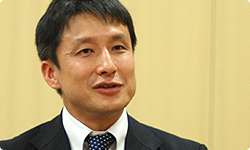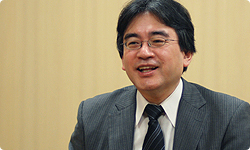5. The Importance of Continuing to Exercise
I’ve heard that you’ve recently written a paper on the subject of Wii Fit.
That’s right. It should end up being published in an academic journal. It is still only a matter of months since I began my research, but I honestly didn't expect it to get the kind of response it’s had. I can’t talk in detail about it yet, but I’m hoping to be able to make the results of my research known worldwide.
Is that so?
I really didn’t think that I would end up attracting so much attention from around the world. It’s really all come as a complete surprise.
Well, there are more people in America and Europe who use Wii Fit than there are in Japan. So on the global level, there have been a huge number of weighing scales and exercise support software that have spread to homes around the world. So when an expert like you uses some evidence to show that doing this exercise can have real benefits, his research will be highly acclaimed worldwide.
Yes, I think that’s the case. Naturally, the fact that there is such a large number of users is one of the reasons for the scale of the impact and when this is combined with real, solid evidence, as a side effect, I believe that this has had an influence on the academic world of researchers.
At Nintendo, we came up with the concept for Wii Fit as non-experts, without any knowledge of the world of sports science. So now for elements of the software to be commended by specialists in the field, and to even be given advice by them on how to increase the value of the exercise programme, makes me feel that this thing which we got started has been taken to the next level.
I have actually learned a great deal from Wii Fit, in all kinds of ways. I have been surprised to learn that there were these methods of getting people to do activities and also that Wii Fit was able to do things that we were unable to do.

Could you give us some examples of this?
I spoke a little about it earlier, but Wii Fit really lowered the barriers people have when it comes to exercise. When we speak to people in order to encourage them to exercise, a barrier always appears. But with this software, that barrier gets dramatically lowered. This shows that it's not always the case that people want to be taught what to do by other people.
When people are dealing with another person, the less confidence they have, the more they are going to worry about what the other person thinks of them…
People really don’t like to be judged by others.
And because they don’t like to be judged, they will often try to avoid things, even if they know that it’s something important.
Exactly. Among people in my line of work, and not forgetting fitness instructors, our way of giving people guidance about physical exercise has often been to constantly stand beside them saying: “Do this! Do that! It’s better if you do it like this!” Many people believe this to be a good method of instruction, and there are many who think that by getting people to come to gyms as often as possible, they'll be able to instruct them better.
There may be a kind of unquestioned assumption on the part of the instructors that the more concentrated and focussed the instruction, the better quality it is.
I think there is exactly that kind of assumption. But it's not actually the case. Even if you only meet with someone once every three months or so, if you manage to come up with a programme where the person doing the training actually becomes aware themselves of the value of exercising, this is often the most beneficial way for that person and is actually easier for them to stick to. With busy people in particular, such as a middle-aged father, they tend to have a good knowledge of themselves and their lifestyles. With people like that, rather than have instructors standing beside them constantly…
It’s better to avoid interfering and let them do things in their own way as much as possible.
That’s why I realised that we have to change the way we think about our guidance. I have always had a tendency to talk a lot and to push people to do things...
(laughs)
To someone like myself who is basically the very model of a pushy gym instructor, I’ve really been able to gain a lot from working with Wii Fit.
So you realised that there are alternative ways of going about things.
It has been a genuinely educational experience for me and I realised that I need to reassess many things. These are the things that I have been taught by Wiibo.
(laughs)
There was also one other thing that surprised me.
What was that?
When I first heard that it would cost 2000 yen, I thought that I had misheard. (laughs) My wife was also taken back, saying: “Is it really 2000 yen?"
The reason why I decided on that price for the Japanese version of the game was because I wanted all those customers who owned Wii Fit to stay on board with us on this one.
I see.
If we had set the same trade price as we would for a normal piece of software, I think that at best we would have had perhaps only half of those owners buying it. That’s why we decided that we wanted as far as possible to get everyone on board with this one.* *The final retail prices in Europe are determined by the retailers.
Right. Even if people had put away the Wii Balance Board, with this they will come back to it and be encouraged to continue using it.
Our recurring theme this time has really been "continuation".

It has, hasn’t it?
We spoke earlier about how to remove barriers, but actually what we do is identical. Video games should ultimately be enjoyable, but there are times when people play continuously, and there are times when they take a break.
Right.
There are those happy times when you just want to keep playing to find out what happens next, but it isn’t always like this and there are times when once you take a break, you don’t touch the game.
Right, you don’t touch it.
For that reason, I think putting games together in a way that makes people want to continue playing them is extremely important.
I see. That really is just the same as with exercise.
Yes it is. Thank you very much for speaking with me today.
Well, I fear I had rather a lot to say! (laughs) But it was my pleasure. Thank you very much!
